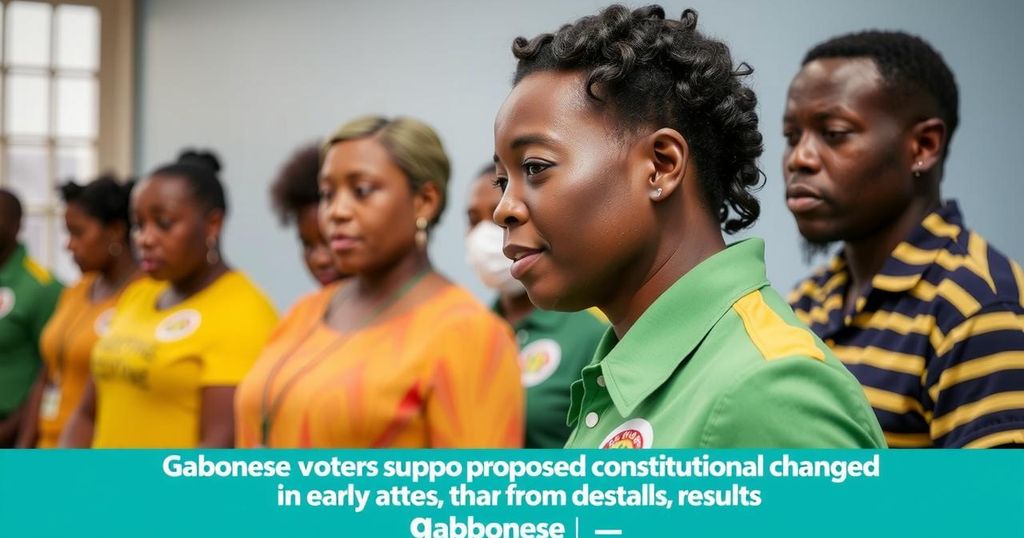Gabonese Referendum Approves New Constitution Amidst Controversy

Gabonese military rulers announced overwhelming approval for a new constitution in a recent referendum, with 91.8% of voters in favor amidst a backdrop of reduced voter turnout. The new constitution introduces term limits and disallows dynastic power, yet faces criticism over its potential to foster authoritarian rule. The integrity of the electoral process remains a concern as the nation prepares for its next presidential election in 2025.
The military governance in Gabon declared that a new constitution has been overwhelmingly approved following a referendum, as provisional results indicated a 91.8% majority in favor. A total of approximately 860,000 registered voters were urged through various media channels to participate in the voting process, which offered a green ballot for “yes” and a red one for “no.” The proposed constitution outlines a presidency restricted to two seven-year terms while abolishing the position of prime minister and prohibiting dynastic succession.
Despite the junta’s propaganda campaign, which dominated the lead-up to the referendum, voter turnout was reported at 53.54%, falling short of expectations. Nevertheless, the election occurred without serious disturbances at the 2,835 polling stations across the nation. In an effort to maintain order, a night curfew was extended to midnight throughout the electoral process. The new constitutional provisions will necessitate that all presidential candidates possess Gabonese nationality, excluding former ruler Ali Bongo Ondimba, who has a non-Gabonese spouse.
Transitional president Brice Oligui Nguema, while casting his vote, remarked that the referendum represented a significant advancement for the nation, stating that “All Gabonese are coming to vote in a transparent fashion.” However, critics have expressed concerns that the constitution is designed to solidify authoritarian rule, with lawyer Marlene Fabienne Essola Efountame arguing, “We are creating a dictator who designs the constitution for himself.”
Gabon has experienced political turmoil following the coup that ousted Bongo, which occurred amidst claims of electoral fraud and corruption. Although the new governance insists that the recent referendum was transparent, apprehensions remain regarding its integrity with no international observers present. The final vote tally is pending confirmation from the constitutional court. Despite the criticisms, a recent survey indicated that 87% of respondents believe the country is moving in the right direction, with significant issues such as unemployment, healthcare, and living costs also highlighted in public concern.
With Oligui emerging as a potential favorite for the upcoming presidential election planned for August 2025, the current atmosphere remains charged with anticipation and skepticism. This constitutional approval marks an important, albeit contentious, step in Gabon’s future governance, which continues to evoke strong public emotion and debate.
The recent referendum in Gabon, following a coup last year, is pivotal in determining the nation’s governance structure and presidential authority. The proposed constitution aims to establish clear rules regarding presidential tenure while addressing issues related to dynastic succession and eligibility requirements for candidates. Amidst the backdrop of political upheaval, including the ousting of longtime leader Ali Bongo, the referendum offers insight into the populace’s support for the military junta and the potential direction of Gabon’s political future. Voter turnout and the integrity of the electoral process remain critical concerns as Gabonese citizens engage in this significant national decision.
In summary, Gabon’s recent referendum has resulted in a decisive endorsement for a new constitution, signifying a transformative period in the nation’s governance landscape. Despite significant public support for the proposed changes, concerns about authoritarianism and the integrity of the electoral process persist. The upcoming presidential election will further test the public’s faith in the transitional leadership and the effectiveness of the new constitution as Gabon navigates its political future.
Original Source: www.tiogapublishing.com








